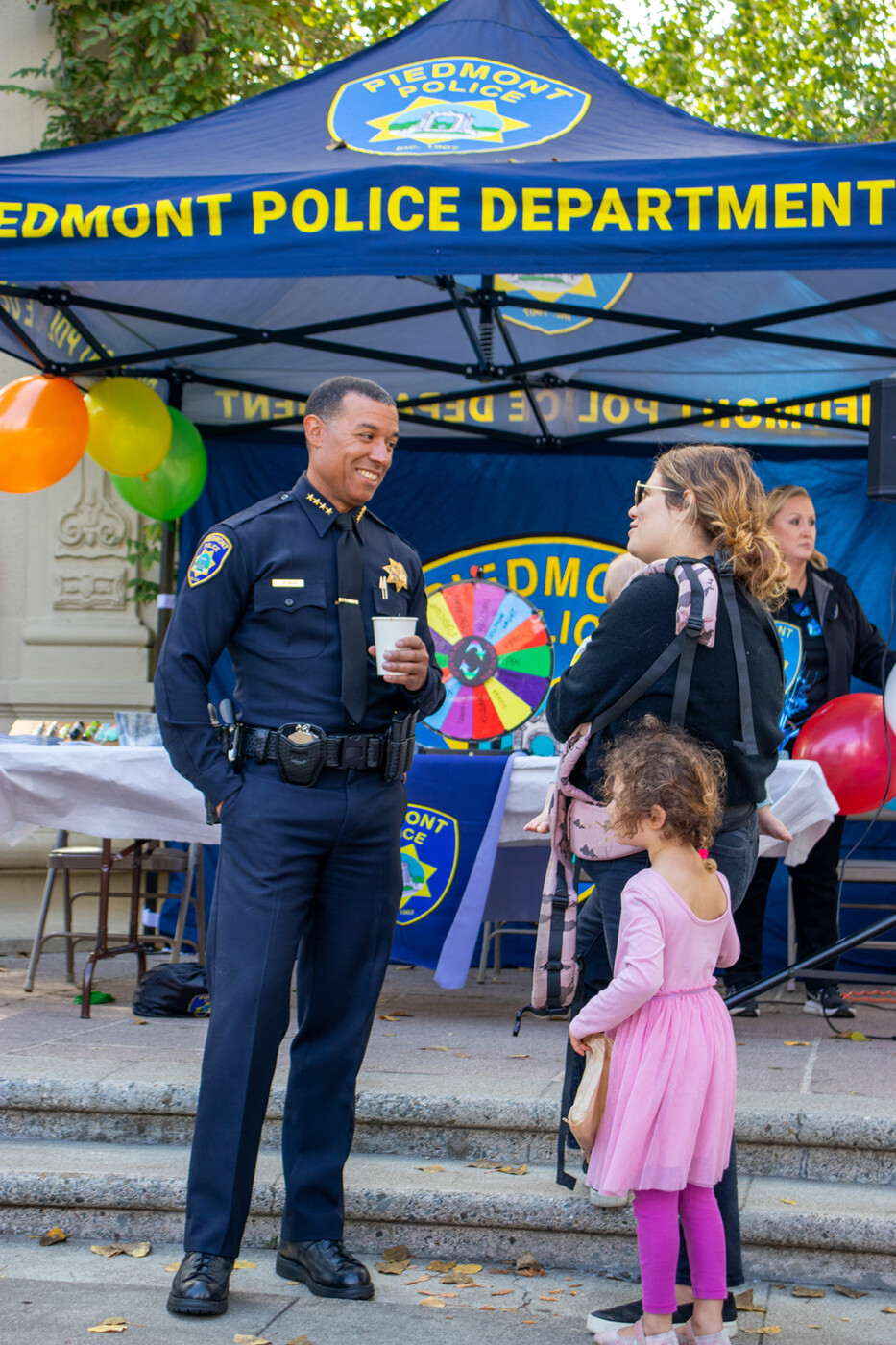Piedmont Police Chief Jeremy Bowers entered the coffee shop with a brace on his left arm, running from near his shoulder down to near his wrist. No, he is not on his way to becoming Robocop. In fact, the injury, a torn bicep tendon, came in the least Robocop way imaginable. It happened at a Giants game. “It involved Lou Seal, an air cannon, and a T-shirt,” Bowers said. “I missed the catch, fell down underneath the seat, reached my arm down in between my seat at an awkward angle to grab it, some A’s fans were trying to get it, coming over the top, when I pulled it up, it got caught in the seat.”
He noted the timing was poor. He’ll be turning 50 on July 17, which will coincide with his retirement as Chief of Police after nine years. It will be at the least a temporary conclusion to a 29-year career in law enforcement.
“We’ll see,” Bowers said when asked about his future. “I can guarantee I will not be a police chief ever again. Who knows, but I really have no interest in continuing a policing career in that way. It’s a profession I love. It’s meaningful to be a part of it just in terms of the impacts that you can have. There may be something that could interest me.” In the meantime, Bowers says he is looking forward to taking a break and evaluating what might come next.
His wife Tricia is a sergeant with the Santa Clara Police Department and will retire in three months. Their oldest son Jordan just graduated from the University of Oregon and is interested in joining the Portland Police Bureau. Middle child Andre is attending Merritt College and daughter Anjali is a student at Piedmont High School. “It’s a good time to be able to turn the page and start a new chapter,” Bowers said.
Bowers came to Piedmont in 2014 after 18 years at the San Jose Police Department. He followed his good friend Rikki Goede, his predecessor as Chief. Two years later, Goede moved on and Bowers was named Chief.
Secret Service internship was first law enforcement experience
Bowers was born in Boulder Creek in the Santa Cruz mountains. His father had been serving in the military in Germany and the family moved to Boulder Creek because an aunt and uncle lived there. Multiple members of his family had served in the military, including a grandfather who was a POW during World War II.
He graduated from San Lorenzo Valley High School-Felton, where he ran track in the 100, 200 and 400 meters as well as on the relay teams. He then went to San Francisco State University for three years. In his freshman year, he got an internship with the Secret Service in their San Francisco office.
“It was a great experience,” Bowers said of his internship. “They were so giving with their time, too. I mean, I’m a kid. “I was processing counterfeit note reports. I was doing the preliminary processing, triaging those. Periodically, the agents on low-level stuff would allow me to tag along.”
The experience did focus what Bowers wanted to do as a career.
“It made me realize that Federal law enforcement is probably not the area I wanted to go into,” he said. “I wanted a variety of assignments and I wanted to have a little bit more of a community touch with policing. What I came to understand with certain aspects of Federal law enforcement is that you’re a little bit detached from community policing. It’s very different. And also I wanted more autonomy… the allure of being a beat cop.”
After his junior year, Bowers decided to apply to the police academy for the San Jose Police Department. He said the Secret Service internship probably got him the job in San Jose despite his youth. He said he barely cleared the 20 ½ minimum age for the police academy. He was offered a position and dropped out of San Francisco State.
“In September ’96, started academy, by February ’97, on the streets of San Jose,” he said. He later completed his Administration of Justice degree at San Jose State and earned a Masters in Criminology, Law and Society from UC Irvine.
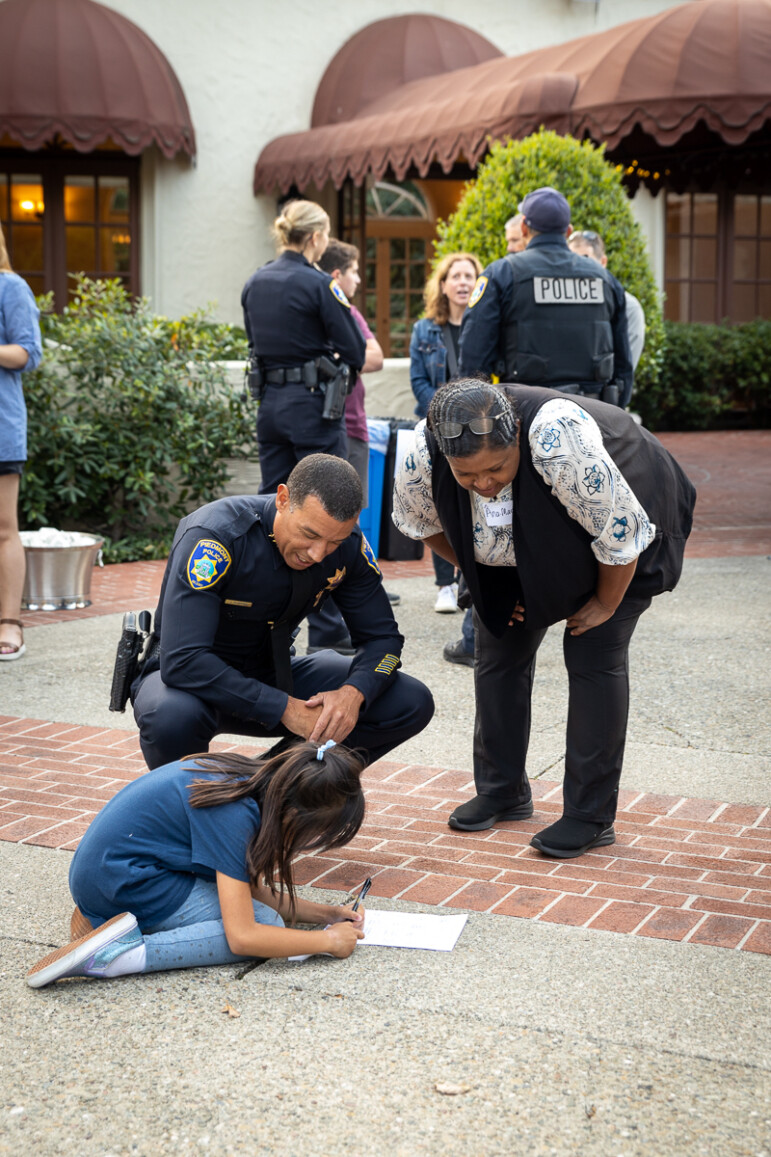
Bowers was a familiar face at community events, like this Newcomers reception in 2023
Bowers credits former police chief with laying important groundwork for Piedmont department
A car crash involving a relative and the fact that he had three young children caused Bowers to start looking for a change after 18 years. Goede, whom Bowers likens to a big sister, gave him the opportunity when she invited him to come over to the Piedmont Department in 2014.
“We had discussions about (succeeding her),” Bowers said. “Nothing was ever a given when I got the Captain’s spot. One, it’s not her decision. Obviously, she is very influential in terms of her recommendation to the decision-makers. But really, it was more of a conversation, ‘Hey, there’s an opportunity to be a Captain up here. I’m going to be here for as long as I’m going to be here. We’ll see what happens. But it’s a great opportunity when I leave for you to step in depending on how things go.’”
Bowers said his top accomplishments in Piedmont have been continuing with many of the programs Goede started. “I really think Rikki did a lot of the heavy lifting,” Bowers said. “She came in at a tumultuous time for the city. They were experiencing some high-profile home invasion robberies and the city was really on edge.
“She was a pioneer. She launched the beginnings of our license plate reading program before it was even common. So she was a pioneer in that respect. She did the heavy lifting in professionalizing the organization. When we started discussing me coming over, she was really looking for a partner to help cement the changes that she was seeking to make.”
Bowers added that as a chief, he set the tone. But that the driver of implementation is the captains and sergeants in the department. And he said coming from the San Jose Department gave himself and Goede a blueprint. Bowers said his goals when he took over were to find more ways to integrate with the community.
Community outreach, new dispatch center
“We had no social media footprint at all,” he said. “Obviously that’s not the only way you communicate with your community, but it is a major way you communicate with your community. With the thinly-staffed department that we had, that was a challenge.”
“It’s things like the Cop on the Block program. It’s things like doing National Night Out. We had never done National Night Out.”
He added, “That’s what’s going to build your trust, your legitimacy with the community. And that’s what’s going to affect feelings of safety as well.”
Other changes during Bowers’ tenure include a staffing study, so that the city can potentially expand the department in the future and the current construction of a new dispatch center.
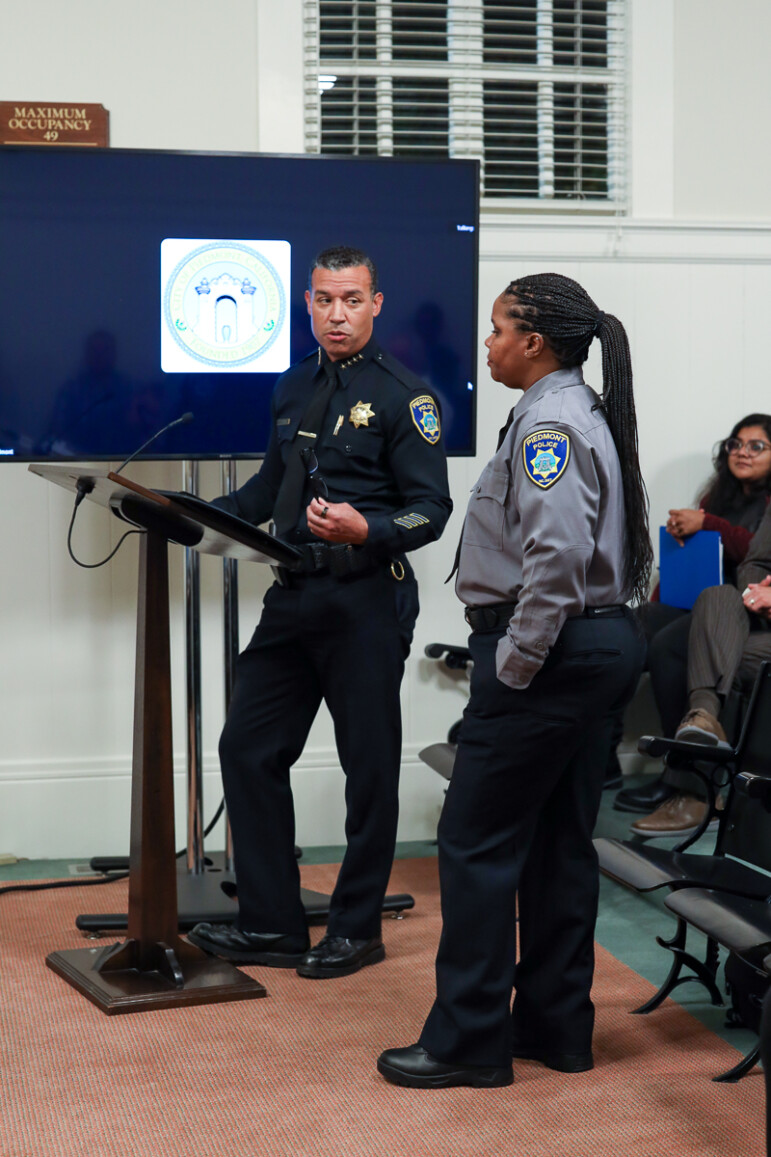
Chief of Police Jeremy Bowers introduces new Dispatch Supervisor Mercedes Bolds in January 2025. 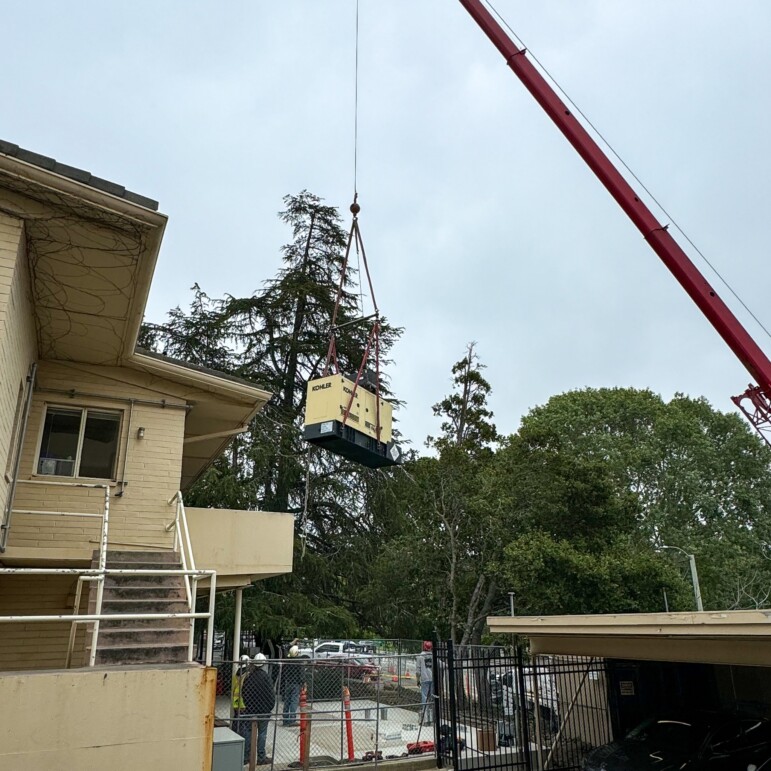
A new backup generator and motor control center electrical panel for the new 911 Dispatch Center was put in place in early June.
Bowers said building the new dispatch center created more space in the Police Administrative Building. “Being able to bring in an interview room, have another little conference room where we can do training,” he said, adding that if the Department ever builds a new police facility, the new dispatch center won’t have to be replaced.
George Floyd murder forced police departments to reckon with conduct
Bowers’ tenure in Piedmont included several changes to policing nationally. “Policing is always evolving,” he said. “As we were going through the pandemic, and then we had the tragic murder of George Floyd, that was really a time where I think as a profession, in a way that I have never seen in my almost 30 years, that people were taking stock of how we do business. It was challenging.”
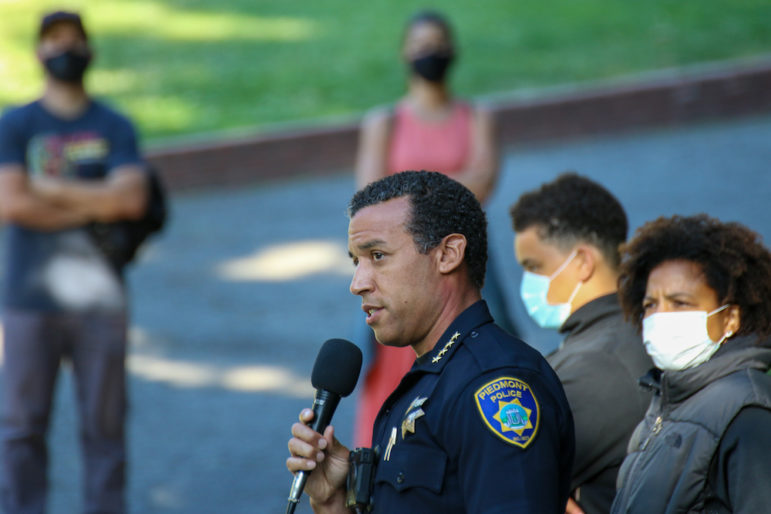
Bowers speaking at a Black Lives Matter protest in 2020
“There was nobody that can look at what happened (to Floyd) and justify the nature of what they saw. At the same time, the reaction to it was so widespread that everybody (in law enforcement) felt like they were being painted with this brush of needing to be accountable for the history of policing and the implications of that history in modern day circumstances. With any of those types of circumstances, it provides an opportunity to look at the way you do business, your policies, your procedures, your practices, how you’re training and that’s really what agencies did.”
He added, “What I think came out of that is a more nuanced approach … it’s not either crime control, or not holding anybody accountable. You can engage in rehabilitation. But you can also hold people accountable. You can do intelligence-led policing and Constitutional policing where you’re rooting out, to the best of your ability, bias and some of those things that lead to all the disparities. We can walk and chew gum at the same time.”
He pointed out that in California, officers can now be de-certified for gross misconduct, meaning they can no longer work as a police officer in the state.
Crime rates vs. perceptions
Crime and the perception of crime is another big picture question. Crime rates are a fraction of what they were 35 years ago, both nationally and in the Bay Area. However, people don’t always see that.
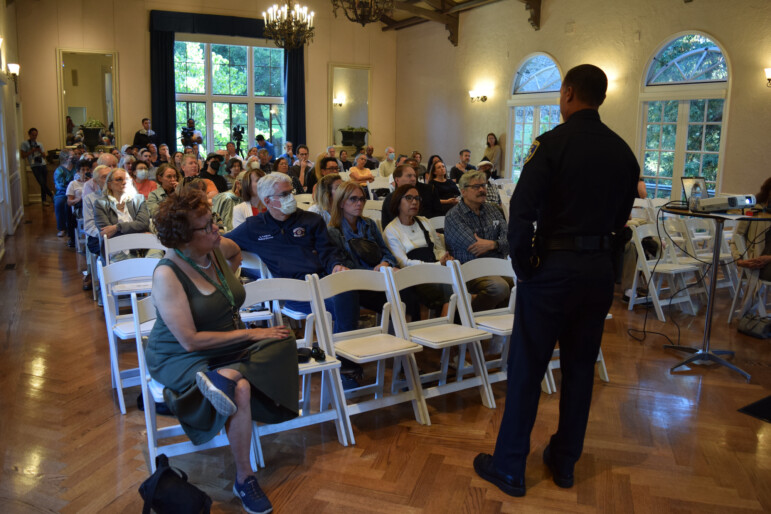
“When people don’t have effective policing, their perception of crime is going to be worse than if they have effective policing,” Bowers said. “When you call 911, we’re going to come. And when we come, we’re going to do a thorough investigation, we’re going to do everything we can to catch the person responsible. While you’re a victim of crime and that’s not a good feeling, your perception of your safety and our response to it is a little bit heightened versus
when you’re a victim of crime in another city and you call and they tell you nobody’s coming for two days.”
ICE raids pose new challenges for local police
A new concern is Immigration and Customs Enforcement (ICE), which has expanded raids all over the country including California. There are reports of people being pulled off the street by masked Federal agents that don’t identify themselves or show a warrant. Potential conflicts with local law enforcement agencies seem possible. The recently-passed budget reconciliation bill expands funding of ICE, making it larger than the U.S. Marine Corps.
Bowers noted that California passed Senate Bill 54 in 2017 which prevents state and local law enforcement agencies from helping ICE with arresting suspected illegal immigrants. “It’s very clear what we’re legally confined to do with relation to immigration enforcement and what we’re not,” he said. “So we don’t engage in the civil immigration enforcement. If there’s a criminal warrant out for somebody’s arrest, that’s a different story.”
Piedmont received a call earlier this year when a resident thought they saw an ICE raid in town. Bowers said he called the local Department of Homeland Security lead agent and cleared up that it wasn’t ICE. It turned out to be security officers working with PG&E. Bowers’ main concern is that the ICE and immigration enforcement may make it harder to fight local crime.
“Maybe the bigger picture is the impacts of these policies,” he said. “To me, as big of a concern is the potential chilling effect on people who feel they’re vulnerable to immigration enforcement to not report that they are a victim of crime. Not only residents of Piedmont but people who work in Piedmont, people who are service providers, people who visit Piedmont. That’s my concern and that’s my concern outside of Piedmont as a police professional.”
